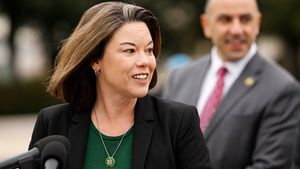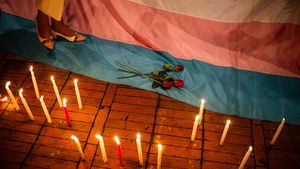U.S. cities score big in LGBTQ+ equality despite wave of discriminatory state laws

A record number of cities achieved a perfect Municipal Equality Index score in 2024.

Christopher Wiggins
Christopher Wiggins is a senior national reporter for The Advocate. He has a rich career in storytelling and highlighting underrepresented voices. Growing up in a bilingual household in Germany, his German mother and U.S. Army father exposed him to diverse cultures early on, influencing his appreciation for varied perspectives and communication. His work in Washington, D.C., primarily covers the nexus of public policy, politics, law, and LGBTQ+ issues. Wiggins' reporting focuses on revealing lesser-known stories within the LGBTQ+ community. Key moments in his career include traveling with Vice President Kamala Harris and interviewing her in the West Wing about LGBTQ+ support. In addition to his national and political reporting, Wiggins represents The Advocate in the White House Press Pool and is a member of several professional journalistic organizations, including the White House Correspondents’ Association, Association of LGBTQ+ Journalists, and Society of Professional Journalists. His involvement in these groups highlights his commitment to ethical journalism and excellence in the field. Follow him on X/Twitter @CWNewser (https://twitter.com/CWNewser) and Threads @CWNewserDC (https://www.threads.net/@cwnewserdc).
Christopher Wiggins is a senior national reporter for The Advocate. He has a rich career in storytelling and highlighting underrepresented voices. Growing up in a bilingual household in Germany, his German mother and U.S. Army father exposed him to diverse cultures early on, influencing his appreciation for varied perspectives and communication. His work in Washington, D.C., primarily covers the nexus of public policy, politics, law, and LGBTQ+ issues. Wiggins' reporting focuses on revealing lesser-known stories within the LGBTQ+ community. Key moments in his career include traveling with Vice President Kamala Harris and interviewing her in the West Wing about LGBTQ+ support. In addition to his national and political reporting, Wiggins represents The Advocate in the White House Press Pool and is a member of several professional journalistic organizations, including the White House Correspondents’ Association, Association of LGBTQ+ Journalists, and Society of Professional Journalists. His involvement in these groups highlights his commitment to ethical journalism and excellence in the field. Follow him on X/Twitter @CWNewser (https://twitter.com/CWNewser) and Threads @CWNewserDC (https://www.threads.net/@cwnewserdc).
























































